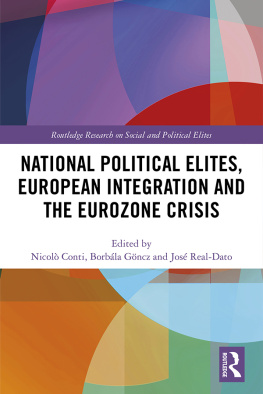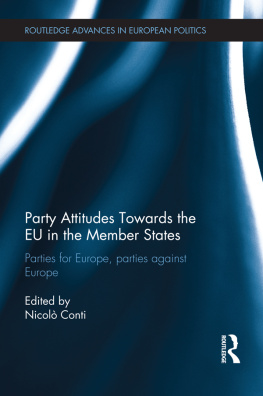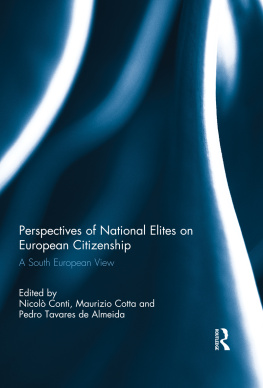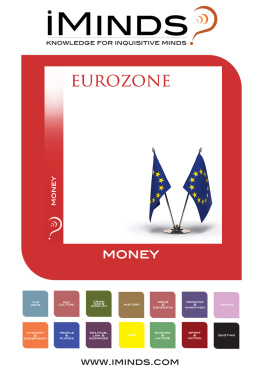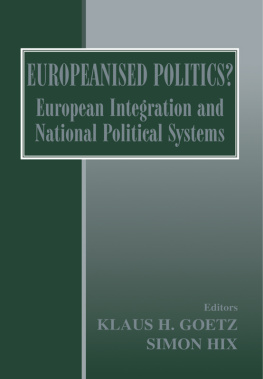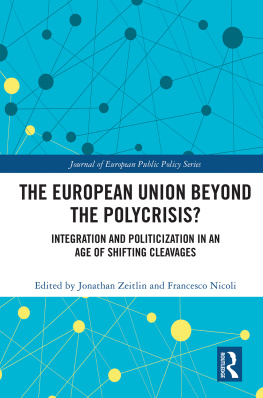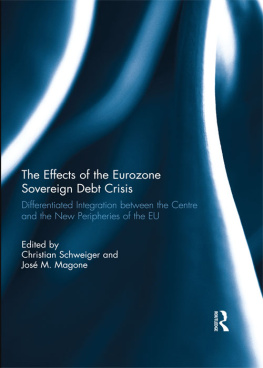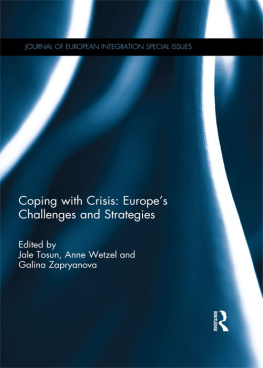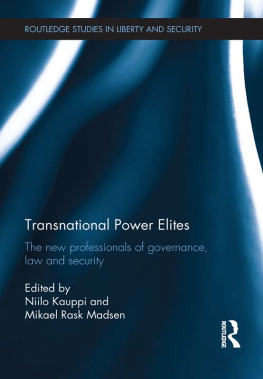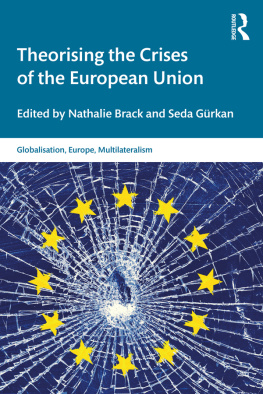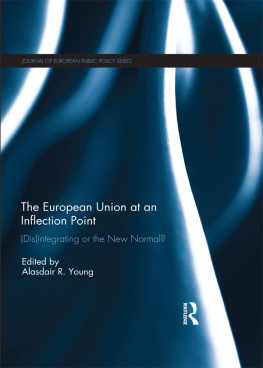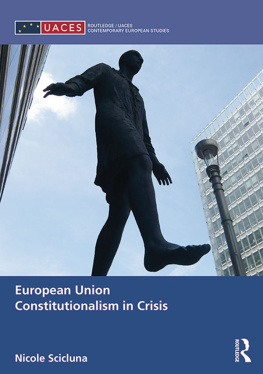National Political Elites, European Integration and the Eurozone Crisis
The global financial, economic and sovereign debt crisis since 2008 has led to increases in political disaffection among citizens, a loss of legitimacy of political institutions, the discredit of mainstream parties and the rise of extremist or anti-system political alternatives.
This comparative volume sheds greater light on this critical juncture in the recent history of the European Union (EU) by focusing on the evolution of attitudes of national political elites. It examines whether the crisis has affected the legitimacy of the EU integration project as perceived by national political elites and, consequently, if the elite consensus that constituted one of the most solid fundamentals supporting that project has been eroded. Analysing these changes across the different dimensions in which support for the EU is organized and its relationship with the evolution of support towards European integration among citizens in member states, the book addresses a basic question: How have these events affected the perceptions of the EU of national political elites? Ultimately, it sheds light on the evolution of the relationship between the perception of the EU and the national contexts, as well as the likely evolution of the project of European integration in the near future.
This book will be of key interest to scholars and students of political elites, EU politics, European integration, political parties, and more broadly to comparative politics, European studies and sociology.
Nicol Conti is Professor of Political Science at the Unitelma Sapienza University of Rome, Italy.
Borbla Gncz is a Research Fellow at the Institute of Sociology and Social Policy at the Corvinus University of Budapest, Hungary.
Jos Real-Dato is Associate Professor in Political Science and Public Administration at the University of Almera, Spain.
Routledge Research on Social and Political Elites
Series Editors: Keith Dowding and Patrick Dumont
Australian National University, Australia
Who are the elites that run the world? This series of books analyses who the elites are, how they rise and fall, the networks in which they operate and the effects they have on our lives.
The Selection of Political Party Leaders in Contemporary Parliamentary Democracies
A Comparative Study
Edited by Jean-Benoit Pilet and William P. Cross
The Selection of Ministers around the World
Edited by Keith Dowding and Patrick Dumont
Party Members and Activists
Edited by Emilie van Haute and Anika Gauja
Political Representation
Roles, Representatives and the Represented
Edited by Marc Bhlmann and Jan Fivaz
Ministerial Survival during Political and Cabinet Change
Foreign Affairs, Diplomacy and War
Alejandro Quiroz Flores
Government Formation and Minister Turnover in Presidential Cabinets
Comparative Analysis in the Americas
Edited by Marcelo Camerlo and Cecilia Martnez-Gallardo
The Selection of Politicians in Times of Crisis
Edited by Xavier Coller, Guillermo Cordero and Antonio M. Jaime-Castillo
National Political Elites, European Integration and the Eurozone Crisis
Edited by Nicol Conti, Borbla Gncz and Jos Real-Dato
National Political Elites, European Integration and the Eurozone Crisis
Edited by Nicol Conti, Borbla Gncz and Jos Real-Dato
First published 2018
by Routledge
2 Park Square, Milton Park, Abingdon, Oxon OX14 4RN
and by Routledge
711 Third Avenue, New York, NY 10017
Routledge is an imprint of the Taylor & Francis Group, an informa business
2018 selection and editorial matter, Nicol Conti, Borbla Gncz and Jos Real-Dato; individual chapters, the contributors
The right of Nicol Conti, Borbla Gncz and Jos Real-Dato to be identified as the authors of the editorial matter, and of the authors for their individual chapters, has been asserted in accordance with sections 77 and 78 of the Copyright, Designs and Patents Act 1988.
All rights reserved. No part of this book may be reprinted or reproduced or utilised in any form or by any electronic, mechanical, or other means, now known or hereafter invented, including photocopying and recording, or in any information storage or retrieval system, without permission in writing from the publishers.
Trademark notice: Product or corporate names may be trademarks or registered trademarks, and are used only for identification and explanation without intent to infringe.
British Library Cataloguing-in-Publication Data
A catalogue record for this book is available from the British Library
Library of Congress Cataloging-in-Publication Data
A catalog record has been requested for this book
ISBN: 978-1-138-47978-4 (hbk)
ISBN: 978-1-351-06482-8 (ebk)
Typeset in Times New Roman
by Wearset Ltd, Boldon, Tyne and Wear
Contents
Figures
Tables
Contributors
Heinrich Best is Senior Professor of Sociology at the Friedrich-Schiller-Universitt of Jena (Germany) and Deputy Director of the Centre for Research on Right-Wing Extremism, Civic Education and Social Integration. Since 2012 he is chair of the IPSA Research committee on Political Elites. He has published widely in the field of elite research, methods of empirical research, political and historical sociology. Recent books include The Europe of Elites: A Study into the Europeanness of Europes Political and Economic Elites (Oxford University Press, 2012, co-edited with G. Lengyel and L. Verzichelli); Parliamentary Elites in Central and Eastern Europe (Routledge, 2014, co-edited with E. Semenova and M. Edinger); and The Palgrave Handbook of Political Elites (Palgrave Macmillan, 2018, ed. with John Higley et al.).
Nicol Conti is Professor of Political Science at the Unitelma Sapienza University of Rome. His main research focus is on parties, elites, public opinion and the EU. He is the author of Citizens, Europe and the Media. Have New Media Made Citizens More Eurosceptical? (Palgrave, 2016, co-authored with V. Memoli) and editor of Party Competition and Political Representation in Crisis: A Comparative Perspective (Party Politics, special issue, 24(1), 2018; co-edited with S. Hutter and K. Nanou).
Maurizio Cotta is Professor of Political Science at the University of Siena where he is the Director of the Center for the Study of Political Change (CIRCaP). Among other works he has co-edited: Parliamentary Representatives in Europe, 18482000 (Oxford University Press, 2000, with H. Best); Democratic Representation in Europe (Oxford University Press, 2007, with H. Best); and Technocratic Ministers and Political Leadership in European Democracies (Palgrave 2018, with A. Costa Pinto and P. Tavares de Almeida).
Borbla Gncz is a Research Fellow at the Institute of Sociology and Social Policy at the Corvinus University of Budapest. Her research interests include attitudes towards the European integration process and European identity. Related to these topics she has recently co-authored an article published in Historical Social Research (with G. Lengyel) and co-authored chapters in European Identity in the Context of National Identity


